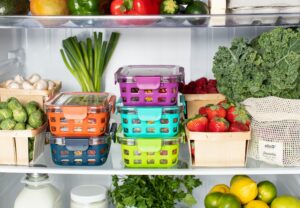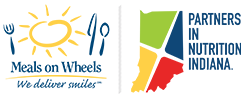Why Should You Worry About Food Safety?
Some of the changes that come with age lessen the body’s ability to combat bacteria. For example, there is a decrease in stomach acid secretion, which is a natural defense against ingested bacteria.
And over time, the immune system may become less adept in ridding the body of bacteria. The sense of taste or smell may be affected by medication or illness so older adults may not always recognize when meat is spoiled, or milk has soured.
By knowing how the body changes and using safe food handling techniques, seniors can easily protect themselves and reduce the risk of foodborne illness.
Guidelines for Safe Food Handling
Wash hands with hot soapy water before and after handling fresh produce, raw meat, poultry, or seafood, using the bathroom, changing diapers, or handling pets.
Keep it safe, refrigerate or freeze. Refrigerate or freeze all perishable foods. Refri gerator temperature should be 40 °F or less; freezer temperature should be 0 °F or less. Use a refrigerator/freezer thermometer to check the temperatures.
gerator temperature should be 40 °F or less; freezer temperature should be 0 °F or less. Use a refrigerator/freezer thermometer to check the temperatures.
Never thaw food at room temperature. Always thaw food in the refrigerator, in cold water, or in a microwave. When thawing in the microwave, you must cook the food immediately. Wash hands with warm soapy water before preparing food.
Never leave perishable food out of refrigeration over two hours. If the room temperature is above 90 °F food should not be left out for over 1 hour. This would include items such as take-out foods, leftovers from a restaurant meal, and Meals on Wheels deliveries.
Wash hands, utensils, cutting boards, and other work surfaces in hot soapy water after contact with raw meat and poultry. This helps prevent cross-contamination.
Wash and refrigerate fresh-cut produce promptly, leftover fresh-cut produce should be discarded after two hours at room temperature.
Do not eat raw or undercooked meat, poultry, fish, or eggs. The most important thing is to use a food thermometer to be sure foods have reached a safe minimum internal temperature.
- Beef, veal, and lamb steaks, roasts, and chops may be cooked to 145 °F.
- All cuts of pork to 160 °F.
- Ground beef, veal, and lamb to 160 °F.
- Egg dishes, casseroles to 160 °F.
- Leftovers to 165 °F.
- Stuffed poultry is not recommended. Cook stuffing separately to 165 °F.
- All poultry should reach a safe minimum internal temperature of 165 °F.
Source: USDA, Food Safety, and Inspection Service. www.foodsafety.gov
